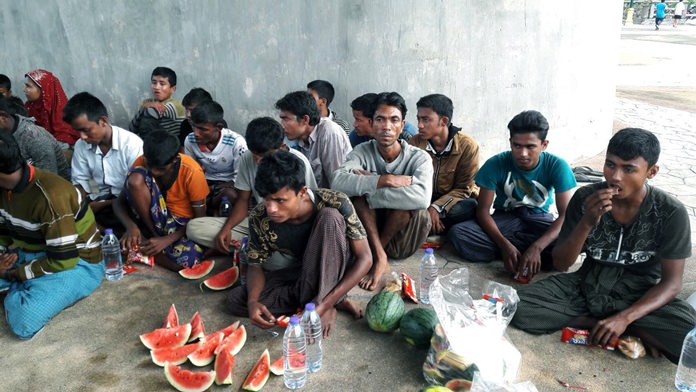
Bangkok (AP) — A boat with 56 people claiming to be Muslim Rohingya refugees from Myanmar was helped back to sea by Thai fishermen and navy craft after being damaged in a storm and stopping temporarily Sunday in southern Thailand.
 Adisorn Chormai, a local official in Krabi province, told The Associated Press that those aboard, who moored at an island there, said they were seeking to go to Malaysia when their boat was damaged Sunday morning.
Adisorn Chormai, a local official in Krabi province, told The Associated Press that those aboard, who moored at an island there, said they were seeking to go to Malaysia when their boat was damaged Sunday morning.
“We found that they had been traveling for about 23 days from Rakhine to escape their situation in Myanmar,” he said.
About 700,000 Rohingya have fled western Myanmar’s Rakhine state to neighboring Bangladesh since a brutal counterinsurgency campaign by Myanmar’s army launched after Rohingya militants staged attacks on security forces last August.
Rohingya, treated as undesirables in predominantly Buddhist Myanmar, used to flee by sea by the thousands each year. The numbers peaked in 2015, sparking a crackdown on their escape route. The boats also leave from Bangladesh, and their passengers are not always all Rohingya.
“I can’t remember the last time we saw such boats. It has been a while,” said Adisorn.
“Their boat is a small fishing boat with partial cover,” he said. “There must have been around 20 children on board. They are tired but no one had medical issues or emergencies that needed the hospital treatment. They seem to want to keep on going.”
Adisorn said Thai villagers supplied them with food and fuel before sending them on their way.
Thailand has an official policy of pushing back boat people from its shores.
Most Rohingya prefer to head to Malaysia, whose dominant Malay Muslim population makes it a more sympathetic destination. There have also been many cases of Rohingya landing in Thailand being taken by human traffickers and forced into near-slavery, held for ransom or otherwise abused.





